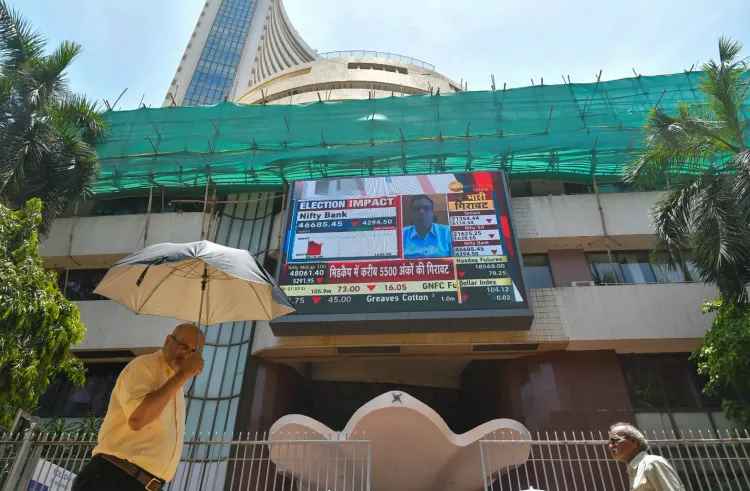Why Did the Indian Stock Market Close Slightly Lower After RBI's Rate Decision?

Synopsis
Key Takeaways
- The Indian stock market closed lower on August 6.
- RBI maintained the repo rate at 5.5%.
- Mixed reactions were observed among investors.
- Banking sector showed relative stability.
- IT sector faced significant selling pressure.
- Broader market experienced heavy selling.
- Future outlook for the economy remains optimistic.
Mumbai, Aug 6 (NationPress) The Indian stock market concluded the day with a slight dip following a day of erratic trading as investors displayed a mixed response to the Reserve Bank of India's (RBI) choice to maintain the repo rate at 5.5 percent.
The Sensex closed at 80,543.99, decreasing by 166.26 points or 0.21 percent. The 30-share index began on a negative note at 80,694.98, compared to the previous session's close of 80,710.25, ahead of the RBI's announcement regarding the rate cut in the morning. During the session, the index recorded an intra-day low of 80,448.82 and a peak of 80,834.43.
The IT sector saw significant selling pressure due to tariff issues. The Nifty index ended at 24,574.20, down 75.35 points or 0.31 percent.
Despite ongoing trade tensions, the local market exhibited resilience, remaining close to the critical support level of 24,500, as noted by analysts.
According to Ashika Institutional Equities, 'Sector performance was mixed, with banks and financial services exhibiting relative stability, while sectors like pharmaceuticals, healthcare, IT, construction, media, and consumer goods showed significant weakness.
The Bank Nifty faced fluctuations as the RBI opted to keep its key policy rate unchanged, a decision that was largely anticipated. This steady monetary policy introduced some uncertainty among market participants.
Notable losers included Sun Pharma, Infosys, Tech Mahindra, Bajaj Finance, Eternal, HCL Tech, TCS, Ultratech, and Bajaj FinServ. In contrast, Asian Paints, Adani Ports, Mahindra and Mahindra, BEL, SBI, and HDFC ended the day in positive territory.
Sectoral indices showed varied results, with Bank Nifty closing flat at 55,411.15, Nifty Auto down 127 points or 0.53 percent, Nifty FMCG dropping 502 points or 0.90 percent, and Nifty IT concluding 608 points or 1.74 percent lower.
Significant selling was observed in the broader market, with Nifty Next 50 falling 580 points or 0.87 percent, Nifty 100 down 101 points or 0.40 percent, Nifty Midcap 100 decreasing 457 points or 0.80 percent, and Nifty Small Cap 100 closing down 201 points or 1.13 percent.
Vinod Nair, Head of Research at Geojit Investments Limited, stated, 'With hopes for a boost in consumption, private investment, and sustained government-led capex, the domestic economy seems well-prepared for a stronger second half, enhancing investor confidence despite external challenges.'









